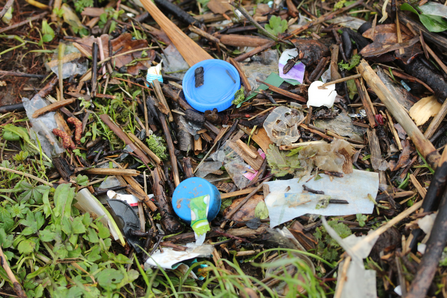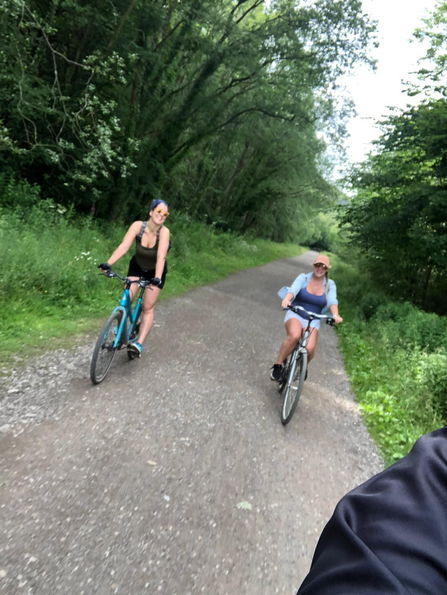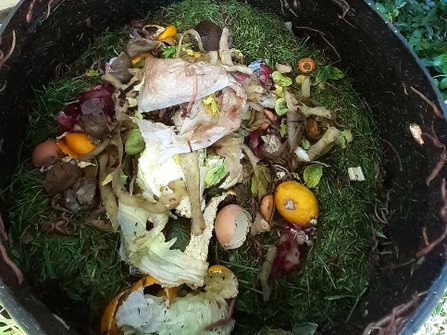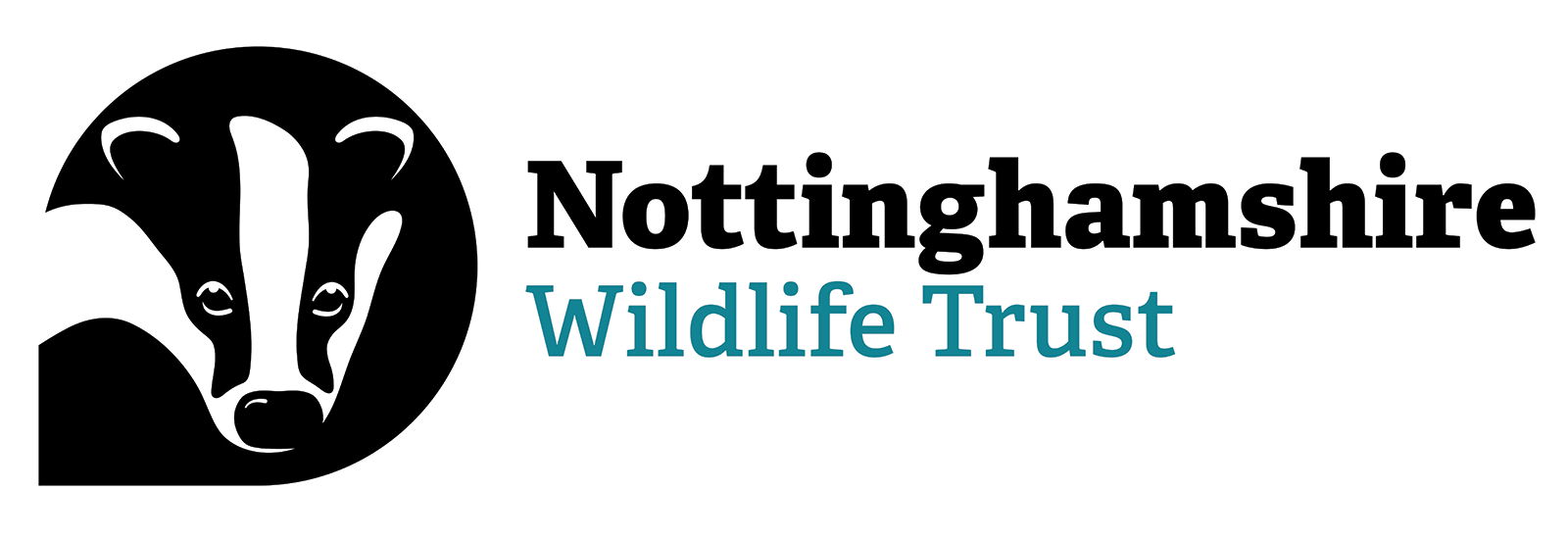I work for Nottinghamshire Wildlife Trust as their Carbon Reduction Champion. I thrive off spending as much time as possible outdoors and surrounded by nature, regularly keeping it wild by walking and cycling around Bulwell and the surrounding areas of Nottinghamshire. I am grateful to be surrounded by so many green spaces in Nottingham.
The 7 R's of Carbon Reduction
Photo © James Wainscoat via Unsplash

Plastic waste is all too common in our green spaces
However, the more time I spend in them, the more I see how poorly some of us are treating these special places. Litter lines the floor of the River Leen, finds itself choked in the bushes and brambles on its banks and is worked into the nests of birds. The river carries any number of pollutants and emissions from nearby industry and vehicles, and micro-plastics are likely to be found. It doesn’t have to be this way. Imagine the opportunities for education, clean-up, re-wilding, linking and improving green infrastructure (spaces, pathways, cycle lanes) and carbon-capture.
I recognised how much carbon (along with all the other greenhouse gases) winds its way through the fabric of our societies. Whether it is emitted from the cars we drive or the industries that make and transport our clothes and food, sprayed under our arms in the form of deodorant or used to power our hospital equipment. There is no denying that industrialisation and our use of greenhouse gases has propelled us to where we are. However, we need to admit we are carbon-dependant, living incredibly impactful, unsustainable ways of life. Detached from the consequences of our actions and lifestyles. Smoke-screened and clouded by conveniences. We must own up to the damage we have caused in the name of progress and find less intensive ways to help humanity move forward. We need to reconnect (or connect for the first time) with nature. It’s what made us, it’s where we come from and we cannot survive without it.
I would like to share my journey so far. It’s important to look over our shoulders, remind ourselves where we have come from, see the progress we have made and put the lessons we have learnt into practice. It started with education, which grew into passion, then action and a complete change of lifestyle. Since then, I have been doing the best I can to reduce my impact and encourage others to do the same.
I committed to changing my behaviours and habits in order to lower my emissions and reduce my impact, helping to restore, preserve and protect our natural environment and improve our health and wellbeing. This in no way means I live a carbon-free life. I am learning and trying every day to get there, but still have a long way to go.
We need to reconnect (or connect for the first time) with nature. It’s what made us, it’s where we come from and we cannot survive without it.Nottinghamshire Wildlife Trust
We need to be wary about doing anything that may inadvertently extend the fossil fuel economy longer than it would otherwise do. We must cut emissions at source and move on from fossil fuel economy. In the meantime, there are opportunities for everyone to increase their knowledge and awareness, become informed and take action to decarbonize and live a more sustainable life. We can all learn and work together.
We can work towards a lower carbon lifestyle by considering the 7 Rs (there are many versions of the ‘Reduce/Reuse/Recycle’ slogan out there, but there are many more opportunities available than those 3 actions, especially when practicing a zero or low waste lifestyle, so my personal efforts to reduce my footprint are based around 7 principles. Plus 7 is my life path number, so it seemed appropriate):
Rethink how natural resources are used and what you are buying. Consume less, waste less, enjoy life more. Understanding that natural resources are limited can greatly influence the choices you make in your everyday life. Every choice you make is very important to the health of the planet.
Refuse to accept or support products and companies that harm the environment. Refuse items that are over-packaged or packaged in plastic, where possible. Invest in a reusable water bottle. Use a reusable shopping bag. Ask for paper bags rather than plastic; my lady at the market now gives me paper bags without being prompted! Refuse paper receipts. Ask your bank to divest from fossil fuels and switch to an ethical bank if they don’t. Look for the Energy Star label when buying new appliances. Join community and activist groups. Get in touch with your MP. Sign those petitions!
Reduce the number or resources used in everyday life. There are so many resources available to help us reduce our energy usage (carry out an energy audit of your home, switch lightbulbs to LED, switch off lights when leaving rooms, unplug electronics and appliances when not in use, lower thermostat temperature in winter, turn water heat down, wash at 30°C, use draught excluders, switch to a renewable/green supplier - but be wary, not all ‘green’ suppliers are as green as they say - and install solar panels, ground source heating and a heat pump if you can - there may be grants available and solar panels in particular have seen an 80% drop in price in the last 10 years).
Be mindful of your water usage. Does the shower need to run for so long before you get in? Does the tap need to be running when brushing your teeth or washing up? Install low-flow shower heads and taps. Install a water-butt in your garden. Eat seasonally and locally where possible. Grow your own food if you can.

Helen Griffiths with her friend Kristie Syson on their bikes - Photo © Daniel Ward
Consider your transportation. Can you drive less? Car share more? Incorporate walking or biking to regular short-trip destinations. Most people can walk a mile in less than 20 minutes. Combine errands to reduce driving time. Use traffic apps to help avoid getting stuck in traffic jams. Use less air conditioning when you drive. Take public transport. Ride a bike and advocate for better bike lanes and infrastructure. Look into electric cars. Even proper maintenance of your petrol or diesel vehicle can reduce its emissions and general wear and tear. Drive more efficiently – avoid unnecessary braking and acceleration and keep your tyre pressure correct.
Reuse, repair or repurpose items instead of throwing them away. Repairing items reduces the consumption of materials and natural resources. By placing value in the items you have and repairing when needed, you are sustaining the products you own and reducing waste.
Rehome items you no longer need. Your trash might be someone else’s treasure. Donate to charity shops, use apps like Olio or Too Good To Go (fighting food waste) or give to family and friends. Rent, borrow or buy second hand clothes.
Recycle where possible, but remember around 91% of plastic is NOT recycled, so consider the above options first. Clothing, shoes, cooking oil, motor oil, electronics, lightbulbs and batteries can all be recycled or disposed of correctly by specialists and local services.

Compost your food waste to reduce landfill usage and improve your soil's health
Rot - compost your food waste. There may be local initiatives if you do not have the facilities at home.
We’re all in this together and we will all be affected if we don’t do something. It’s easy to feel apathy and that the little things you do don’t make a difference. They do. It’s easy to berate ourselves for what we haven’t done or don’t do, and forget to celebrate what we have done and can do.
I have been particularly inspired by the story of the Hummingbird; a parable by the Quechuan people of present-day Ecuador.
This is taken from ‘Flight of the Hummingbird’ by Michael Nicoll Yahgulanaas with Wangari Maathai and His Holiness the Dalai Lama:
Here is the story of the great forest that caught on fire. The terrible fire raged and burned. All of the animals were afraid and fled from their homes. The elephant and the tiger, the beaver and the bear all ran, and above them the birds flew in a panic. They huddled at the edge of the forest and watched. All of the creatures gathered, except one. Only Dukdukdiya, the little hummingbird, would not abandon the forest. Dukdukdiya flew quickly to the stream. She picked up a single drop of water in her beak. Dukdukdiya flew back and dropped the water on the fire. Again she flew to the stream and brought back another drop, and so she continued – back and forth, back and forth. The other animals watched Dukdukdiya’s tiny body fly against the enormous fire, and they were frightened. They called out to the little hummingbird, warning her of the dangers of the smoke and the heat. “What can I do?” sobbed the rabbit. “This fire is much too hot.” “There is too much smoke!” howled the wolf. My wings will burn! My beak is too small!” cried the owl. But the little hummingbird persisted. She flew to and fro, picking up more water and dropping it, bead by bead, onto the burning forest. Finally, the big bear said, “Little Dukdukdiya, what are you doing?” Without stopping, Dukdukdiya looked down at all of the animals. She said, “I am doing what I can."
It’s easy to feel apathy and that the little things you do don’t make a difference. They do.Nottinghamshire Wildlife Trust
The story of the Hummingbird shows how the smallest gestures can have the greatest impact. Every single one of us is capable of making changes in our lives that can and will benefit nature. We can all make a difference, no matter how small.
My random act of wildness during 30 Days Wild is to champion carbon reduction by doing what I can to inform and help people understand its importance. I am here to support, encourage and empower others to take action.
It is our duty to protect Mother Nature from those who refuse to see her beauty. Time is of the essence. We don’t have time for endless debates. We must take action now because every action counts.

